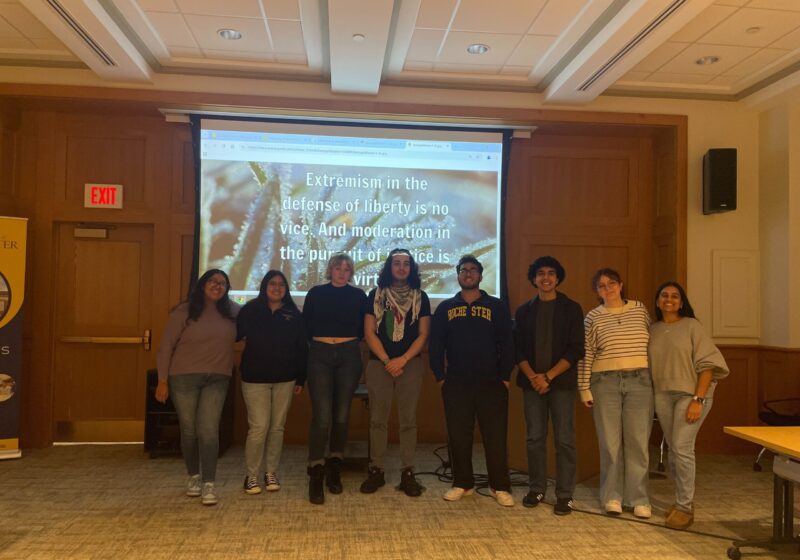With Election Day around the corner, the College Democrats and College Republicans met to discuss three federal topics in a debate hosted by ROCTalks on Oct. 23: housing affordability, climate legislation, and ranked-choice voting.
Three different representatives took turns giving an opening statement on their stance, each of which was followed by a moderated discussion and a response to audience questions.
Beginning with housing affordability, senior and president of the College Democrats Gautam Bajaj said home values have risen by 162% and incomes by 78% since 2000.
Swiftly shifting to a more sentimental tone, he explained that housing is more than just having a roof over your head — it is also about opportunity and stability, both of which can be ensured by expanding affordable housing programs.
Karl Hirsch, senior and President of the College Republicans, argued that housing is perhaps the best example of how the free market can improve the lives of its participants. Per Hirsch, expanding the housing supply reduces rent and makes homes more affordable for purchasers.
Along with housing affordability, climate change was a topic of considerable discussion.
Hirsch emphasized that although people of all political persuasions agree that climate change is real, they differ in how they conceptualize and address it. He brought up two primary models: climate catastrophism and climate realism.
According to Hirsch, the Democrats’ concept of climate catastrophism is detrimental and instills intense fear in younger generations. He stated that the belief in an “Armageddon caused by manmade climate change” leads to the thought that the world is on fire, in turn leading to a concerning decline in the birth rate.
“We must choose realism over catastrophism because our sustainable future should empower, not parallel,” Hirsch said.
Junior and business manager of the College Democrats Alex Hegewald took an economic approach. She discussed the detrimental effects natural disasters have on the economy, including the destruction of infrastructure, increased health costs, agricultural losses, and food shortages.
“We want to make sure that we invest in the American economy and American energy so that we can see that this continues to our future and we preserve our environment, which is something that the people after us are going to inherit as well as the economy,” Hegewald said.
The debate ended with a discussion on ranked-choice voting. Bajaj argued that the Electoral College works against most of the population, referencing the Bush vs. Gore election, in which Gore won the popular vote by half a million but potentially lost the Electoral College because the Supreme Court intervened; and the Trump vs. Clinton election, which ended similarly.
Bajaj also emphasized how unfair it is that the seven swing states determine the election’s outcome, ignoring millions of votes from others. The foundation of the entire voting system is one person, one equal vote. Yet, Bajaj contended that his vote as someone from Michigan will matter more than that of many citizens.
In contrast to Bajaj, Hirsch insisted that the Electoral College protects minority rights by guaranteeing that no group can repeatedly control elections with a simple majority or even a plurality of support. Stability is fostered with the demonstration that you can win through democratic means as opposed to what you would get with ranked-choice voting, which is a rebellion, he said.
“Our commitment to liberalism and our obligation to pass out our freedom to the next generation demand our support of the Electoral College,” Hirsch said.
When asked if their party’s nominee reflects their beliefs, Bajaj, Hirsch, and Hegewald agreed that voters should vote based on their conscience.






